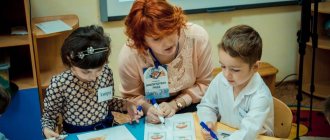Development of fine motor skills through didactic games self-education plan
• Systematic implementation of games and exercises. You should not expect immediate results, since automation of a skill develops through repeated repetition. In this regard, the development of one skill takes place in several sections;
• Sequence – (from simple to complex). First on the right hand, then on the left; if performed successfully, on the right and left hands simultaneously. It is unacceptable to skip something and “jump” over some types of exercises, as this can cause negativity in the child, who is currently physiologically unable to cope with the task;
• Individual and differentiated approach. The selection of games and exercises, their intensity, quantitative and qualitative composition vary depending on the individual and age characteristics of the children. If the child constantly demands to continue the game, you need to try to switch his attention to completing another task. There must be moderation in everything. It is unacceptable for a child to become overtired while playing, which can also lead to negativism.
STAGE 3 - diagnostics, presentation of work experience on the topic.
Reporting form:
— make a consultation for educators and parents on the topic “Development of fine motor skills in preschoolers”;
- compile a card index of finger games and gymnastics;
— organization of the exhibition “Games that promote the development of fine motor skills.”
What is the expected result:
Children have developed fine motor skills, they can hold cutlery and writing utensils correctly, enjoy creative activities, strive to understand the world around them, and ask questions.
Relevance
At the initial stage of life, it is fine motor skills that reflect how the child develops and indicate his intellectual abilities. Children with poorly developed manual motor skills awkwardly hold a spoon or pencil, cannot fasten buttons, or lace up shoes. It can be difficult for them to collect scattered parts of the construction set, work with puzzles, counting sticks, and mosaics. They refuse modeling and appliqué, which other children love, and cannot keep up with the kids in class. Thus, the possibilities for children to explore the world are impoverished. Children often feel incompetent in basic activities available to their peers. This affects the child’s emotional well-being and self-esteem. Over time, the level of development shapes school difficulties.
Fine motor skills - the ability to manipulate small objects, transfer objects from hand to hand, and perform tasks that require coordinated use of the eyes and hands. Fine motor skills are associated with the child’s nervous system, vision, attention, memory and perception. Scientists have also proven that the development of fine motor skills and speech development are very closely related. And this can be explained very simply. The human brain has centers that are responsible for speech and finger movements. They are located very close. Therefore, by developing fine motor skills, we activate the zones responsible for the development of children's speech and increasing the child's performance, attention, mental activity, intellectual and creative activity. In addition, fine motor skills directly affect manual dexterity, which will be formed in the future, the child’s reaction speed, the level of logical thinking, memory, reasoning skills, concentration and imagination.
Self-education plan on the topic: “Finger games and exercises for young children”
Municipal budgetary preschool educational institution
“Combined kindergarten “Yolochka”
| Self-education plan for the 2022-2021 academic year on the topic “Finger games and exercises for young children” teacher of the group "Gnomes" Baeva A.E. Abakan, 2022 Relevance of the topic: Famous teacher and innovator V.A. Sukhomlinsky said that “The mind of a child is at the tips of his fingers.” The baby needs to touch everything, so he will learn to distinguish between heat and cold, hardness and softness, heaviness, size and shape of an object. The hand has the largest “representation” in the cerebral cortex. Finger games create a favorable emotional background, develop the ability to imitate an adult, teach them to listen attentively and understand the meaning of speech, and increase the child’s speech activity. If a child performs exercises, accompanying them with short poetic lines, that is, his speech will become clearer, rhythmic, bright, and control over the movements performed will increase. The child’s memory develops, as he learns to remember certain hand positions and sequences of movements, the child develops imagination and fantasy. Having mastered all the exercises, he can “tell” whole stories with his fingers. Finger games are good helpers in preparing a child’s hand for writing. During my work at a preschool educational institution, I noticed that more and more often children with insufficiently developed speech are entering kindergarten. What is the cause of speech delay? To answer the question, I turned to the research of famous teachers L.P. Savina “Finger gymnastics for the development of speech of preschool children”, E.A. Yanushko “Development of fine motor skills for young children”, S.O. Ermakova “Finger games for children from one to 3 years old.” This topic seemed significant and relevant to me, so I decided to study it through self-education. Target: increasing your theoretical level, professional skills and competence on the issue of teaching young children finger games that promote speech development. Tasks:
Expected results:
| |||||||||||||||||||||||||||||||||||||||||||




